- Home
- Rosamunde Pilcher
Snow in April Page 2
Snow in April Read online
Page 2
“You were just a little boy. Six years old. But you remember that.” He smiled again. Caroline got up and put the old hat back on his head. The peak obliterated his face so that she had to stoop to reach beneath it to kiss him.
“Good night,” she said.
“Good night,” said Jody, not moving.
She was reluctant to leave him. At the foot of the stairs she turned back. He was watching her intently from beneath the peak of the ridiculous cap and there was something in his eyes that made her say, “What’s wrong?”
“Nothing.”
“I’ll see you tomorrow then.”
“Yes,” said Jody. “Sure. Good night.”
* * *
Upstairs again she found the drawing-room door shut, a hum of voices coming from beyond, and Katy putting a dark fur coat on to a hanger and disposing of it in the cupboard by the front door. Katy wore her maroon dress and a flowered apron, her concession to the formality of a dinner party, and she started dramatically when Caroline suddenly appeared.
“Ooh, you didn’t arf give me a start.”
“Who’s come?”
“Mr and Mrs Aldane.” She jerked her head. “They’re in there now. You’d better get a move on, you’re late.”
“I just saw Jody.” Reluctant to join the party, she stayed with Katy, leaning against the bottom on the banister. She imagined the bliss of going back upstairs, climbing into bed, being brought a boiled egg.
“Still watching those Indians?”
“I don’t think so. He said there was too much kissing.”
Katy made a face. “Better watch kissing than all that violence, that’s what I say.” She shut the cupboard door. “I’d rather have them wondering what it’s all about, than going out and coshing old ladies with their own umbrellas.”
And with this telling observation she went back to her kitchen. Caroline, left alone and with no further excuse for delay, crossed the hall, put a smile on her face and opened the drawing-room door. (Another thing that she had learned at Drama School was how to make an entrance.) The buzz of chatter ceased and somebody said, “Here’s Caroline.”
Diana’s drawing-room, at night, lit for a party, was as spectacular as any stage set. The three long windows which faced out over the quiet square were draped in pale, almond-green velvet. There were huge, squashy sofas in pink and beige, a beige carpet, and, blending marvellously with the old pictures, walnut cabinets and Chippendale, a modern coffee table, Italian in steel and glass. There were flowers everywhere and the air was pervaded with a variety of delicious and expensive smells; hyacinths and “Madame Rochas” and Shaun’s Havana cigars.
They stood, just as she had imagined them, grouped around the fireplace, with drinks in their hands. But before she had even closed the door behind her, Hugh had detached himself from the group, laid down his glass and come across the room to meet her.
“Darling.” He took her shoulders between his hands and bent to kiss her. Then he glanced at his wafer-thin gold wrist-watch, displaying as he did so an expanse of starched white cuff caught with links of knotted gold. “You’re late.”
“But the Lundstroms haven’t even come yet.”
“Where’ve you been?”
“With Jody.”
“Then you’re forgiven.”
He was tall, much taller than Caroline, slim, swarthy, beginning to go bald. This made him look older than his actual age, which was thirty-three. He wore the midnight blue velvet dinner jacket and an evening shirt lightly touched with bands of embroidered lace, and his eyes, beneath the strongly marked brows, were a very dark brown and held, at this moment, an expression which contained amusement, exasperation, and a certain amount of pride.
Caroline saw the pride and was relieved. Hugh Rashley took a certain amount of living up to and Caroline spent half her time struggling with sensations of gross inadequacy. Otherwise he was, as a future husband, eminently satisfactory, successful in his chosen career of stock-broking and marvellously thoughtful and considerate even if his standards did sometimes reach unnecessary heights. But this, perhaps, was only to be expected, for it was a characteristic which ran in his family, and he was, after all, Diana’s brother.
* * *
Because Parker Haldane was unrepentantly attracted to pretty young women and Caroline was one of them, Elaine Haldane’s manner towards Caroline was habitually cool. This did not worry Caroline unduly; for one thing, she seldom met Elaine, for the Haldanes lived in Paris, where Parker was in charge of the French department of a big American advertising agency, and only came to London for important meetings, every two or three months. This visit was just such an occasion.
For another, she did not particularly like Elaine, which was unfortunate, for Elaine and Diana were the best of friends. “Why do you always have to be so off-hand with Elaine?” Diana would demand and Caroline had learned to shrug and say “I’m sorry,” for any more detailed explanations could only cause the greatest offence.
Elaine was a handsome, distinguished woman, with a tendency to over-dress which even living in Paris had done nothing to cure. She could also be extremely amusing, but Caroline had learned, through bitter experience, that, buried in her witticisms were sharp barbs of verbal cruelty, directed at friends and acquaintances who did not happen, at the time, to be present. It was daunting to listen to her, because you could never be sure what she was planning to say about you.
Parker, on the other hand, was not to be taken seriously.
“You beautiful creature.” He stooped to sketch a continental kiss over the back of Caroline’s hand. She half expected him to click his heels. “Why do you always have to keep us waiting?”
“I was saying good night to Jody.” She turned to his wife. “Good evening, Elaine.” They touched cheeks, making kissing sounds in the air.
“Hallo, dear. What a pretty dress!”
“Thank you.”
“They’re so easy to wear, those loose things…” She took a pull at her cigarette, exhaled a huge cloud of smoke. “I’ve just been telling Diana about Elizabeth.”
Caroline’s heart sank, but she said, politely, “What about Elizabeth?” waiting to be told that Elizabeth was engaged; that Elizabeth had been staying with the Aga Khan; that Elizabeth was in New York, modelling for Vogue. Elizabeth was Elaine’s daughter, by a previous marriage, and a little older than Caroline, but, despite the fact that Caroline sometimes felt she knew more about Elizabeth than she did about herself, they had never met. Elizabeth divided her time between her parents—mother in Paris and father in Scotland—and on the rare occasions when she turned up in London, Caroline was invariably away.
Now she tried to remember the latest news on Elizabeth. “Hasn’t she been in the West Indies, or something?”
“Yes, my dear, staying with an old school-friend, having the most wonderful time. But she flew home a couple of days ago and was met at Prestwick by her father with this ghastly news.”
“What news?”
“Well, you know, ten years ago, when Duncan and I were still together, we bought this place in Scotland … at least Duncan bought it, in the face of violent opposition from me … Marriage-wise, it was just the last straw.” She stopped, a confused expression on her face.
“Elizabeth,” Caroline prompted gently.
“Oh, of course. Well, the first thing Elizabeth did was to make friends with the two boys who lived on the neighbouring estate … well, not boys exactly, they were already grown-up when we first met them, but completely charming, and they just took Elizabeth under their wing like a little sister. Before you could snap your fingers she was in and out of their house as though she’d lived there all her life. They adored her, but she was always the special pet of the older brother, and my dear, just before she came home, he killed himself in the most terrible car smash. Too ghastly, icy roads, the car went straight into a stone wall.”
Despite herself, Caroline was truly shocked. “Oh, how awful!”
“Oh, ghastly. Only twenty-e
ight. A wonderful farmer, marvellous shot, such a darling person. You can imagine what sort of a homecoming the poor darling had, she rang me up in tears to tell me, and I longed to get her to London and meet us here, and let us cheer her up, but she says she’s needed up there…”
“I’m sure her father will love having her…” Parker chose this moment to materialize at Caroline’s elbow, and handed her a Martini so cold that it nearly froze her fingers. He said, “Who are we waiting for?”
“The Lundstroms. They’re Canadians. He’s a banker from Montreal. It’s all to do with this new project of Shaun’s.”
“Does that really mean that Diana and Shaun are going out to Montreal to live?” asked Elaine. “But what are we going to do without them? Diana, what are we going to do without you?”
Parker said, “How long are they going to be away?”
“Three, four years. Less perhaps. They leave as soon after the wedding as they can.”
“And this house? Are you and Hugh going to live here?”
“It’s much too big. Anyway, Hugh’s got a perfectly adequate flat of his own. No, Katy’s going to stay in the basement as a sort of caretaker, and Diana thought that she might let it if she could find the right sort of tenant.”
“And Jody?”
Caroline looked at him, and then down at her drink.
“Jody’s going with them. To live.”
“Won’t you mind that?”
“Yes, I’ll mind. But Diana wants to take him.”
And Hugh doesn’t want to be saddled with a little boy. Not just yet, at any rate. A baby, perhaps, in a couple of years, but not a little boy of eleven. And Diana’s already got him into a private school and Shaun says he’ll have him taught how to ski and play ice hockey.
* * *
Parker was still watching her. She smiled wryly. “You know Diana, Parker. She makes plans, and bang, they happen.”
“You’ll miss him, won’t you?”
“Yes, I’ll miss him.”
The Lundstroms arrived at last, were introduced, given drinks and drawn, politely, into the conversation. Caroline, moving aside on the pretence of finding a cigarette, watched them curiously and thought that they looked alike, as married people so often do, both tall and angular, rather sporty. She imagined them playing golf together at the weekends or sailing—perhaps ocean racing—in the summer. Mrs Lundstrom’s dress was simple, her diamonds sensational, and Mr Lundstrom had that certain colourless nonentity that often blurs the outline of a spectacularly successful man.
She thought, quite suddenly, that it would be wonderful, like a breath of fresh air, for someone to come into this house who was poor, a failure, without morals, or even drunk. An artist, perhaps, starving in a garret. An author who wrote stories that no one would buy. Or some cheerful beachcomber with a three-day growth of beard and an inelegant belly bulging over the belt of his trousers. She thought of her father’s friends, ill-assorted and usually disreputable, drinking red wine or retsina well into the night, sleeping where they found themselves, on the sagging sofa, or with their feet propped on the low wall of the terrace. And she thought of the house on Aphros, at night, painted by moonlight in blocks of black and white, and always the sound of the sea.
“… we’re going in for dinner.”
It was Hugh. She realized that he had already told her this and been forced to repeat himself. “You’re dreaming, Caroline. Finish your drink, it’s time to go and have something to eat.”
At the dinner table, she found herself between John Lundstrom and Shaun. Shaun was busy with the wine decanter, and so she fell naturally into conversation with Mr Lundstrom.
“Is this your first visit to England?”
“Oh, by no means. I’ve been here many times before.” He straightened his knife and fork, frowning slightly. “Now, I haven’t got this quite straight. This family relationship, I mean. You’re Diana’s stepdaughter?”
“Yes, that’s right. And I’m going to marry Hugh, who is her brother. Most people seem to think it’s practically illegal, but it isn’t really. I mean, there’s nothing about it in the back of the prayer-book.”
“I never thought for a moment that it was illegal. Simply very tidy. It keeps all the right people in the same family.”
“Isn’t that a little narrow minded?”
He looked up and smiled. He looked younger, gayer, and less rich when he smiled. More human. Caroline warmed to him.
“You could call it practical. When are you going to be married?”
“On Tuesday week. I can hardly believe it.”
“And will you both come out to visit Shaun and Diana in Montreal?”
“I expect we shall later on. Not just yet.”
“And then there’s the little boy…”
“Yes. Jody, my brother.”
“He’s coming with them.”
“Yes.”
“He’ll take to Canada like a duck to water. It’s a great place for a boy.”
“Yes,” said Caroline again.
“There are just the two of you?”
“Oh, no,” said Caroline. “There’s Angus.”
“Another brother?”
“Yes. He’s nearly twenty-five.”
“And what does he do?”
“We don’t know.”
John Lundstrom raised polite but surprised eyebrows. Caroline said, “I mean that. We don’t know what he does and we don’t know where he is. You see, we used to live on Aphros in the Aegean. My father was an architect, a sort of agent for people who wanted to buy property and build out there. That was how he met Diana.”
“Now hold it. You mean, Diana came out to buy some land?”
“Yes, and build a house. But she didn’t do either. She met my father and married him instead and she stayed out in Aphros with us all and lived in this house we’d always had…”
“But you came back to London?”
“Yes, my father died, you see, so Diana brought us back with her. But Angus said he wasn’t coming. He was nineteen then, with hair down to his shoulders and not a pair of shoes to his name. And Diana said that if he wanted to stay in Aphros he could, but he said she might as well sell the house, because he’d acquired a secondhand Mini Moke and he was going to drive to India through Afghanistan. And Diana asked him what he was going to do when he got there, and Angus said, find himself.”
“He’s just one of thousands. You know that, don’t you?”
“It doesn’t make it any easier when he’s your brother.”
“Haven’t you seen him since?”
“Yes. He came back soon after Diana and Shaun were married, but you know how these things go. We all thought he’d at least have a pair of shoes on his feet, but he was unchanged and unrepentant and everything Diana suggested just made him worse, so he went back to Afghanistan again, and we haven’t heard from him since.”
“Not at all?”
“Well … once. A picture postcard of Kabul or Srinagar or Tehran or somewhere.” She smiled, trying to make a joke of it, but before John Lundstrom could think up any sort of a reply, Katy leaned over his shoulder to set down a bowl of turtle soup, and, with the conversation broken, he turned away from Caroline and started instead to talk to Elaine.
* * *
The evening wore on, formal, predictable and, to Caroline, boring. After coffee and brandy they all foregathered once more in the drawing-room. The men gravitated into one corner to talk business, the women gathered by the fire, gossiped, made plans for Canada, admired the tapestry on which Diana was currently working.
After a little, Hugh detached himself from the group of men, ostensibly to refill John Lundstrom’s glass. But when he had done this, he came over to Caroline’s side, sat on the arm of her chair and said, “How are you?”
“Why do you ask?”
“Are you well enough to go to Arabella’s?”
She looked up at him. From the depth of the armchair his face appeared almost upside down. It looked o
dd.
“What time is it?” she asked.
He glanced at his watch. “Eleven. Perhaps you’re too tired?”
Before she could reply, Diana, overhearing the conversation, looked up from her tapestry and said, “Off you go, the two of you.”
“Where are they off to?” asked Elaine.
“Arabella’s. It’s a little club Hugh belongs to…”
“Sounds intriguing…” Elaine smiled at Hugh, looking as though she knew all about intriguing night clubs. Hugh and Caroline excused themselves, said good night to the company and left. Caroline went upstairs to fetch a coat, paused to comb her hair. At Jody’s door she stopped, but the light was off and no sound came from within, so she decided not to disturb him, and went downstairs again to where Hugh waited for her in the hall. He opened the door for her and they went out together into the soft, windy darkness, and walked down the pavement to where he had parked his car, and drove around the Square and out into Kensington High Street, and she saw that there was the beginnings of a moon, and rags of cloud were being driven across its face by the wind. The trees in the park tossed their bare branches; the orange glow of the city was reflected in the sky, and Caroline rolled down the window and let the cool air blow her hair and thought that on such a night, one should be in the country, walking along dark, unlighted roads, with the wind soughing in the trees and only the fitful moonlight to show the way.
She sighed. “What’s that for?” asked Hugh.
“What’s what for?”
“The sigh. It sounded like tragedy.”
“It’s nothing.”
After a little, “Everything’s all right?” Hugh asked. “You’re not worried about anything?”
“No.” There was, after all nothing to be worried about. Nothing, and everything. Feeling ill all the time was one of them. She wondered why it was impossible to talk to Hugh about this. Perhaps because he was always so fit himself. Energetic, active, full of energy and apparently never tired. At any rate, it was boring to be in ill-health, doubly boring to talk about it.
The silence between them grew. At last, waiting for traffic lights to change from red to green, Hugh said, “The Lundstroms are delightful.”

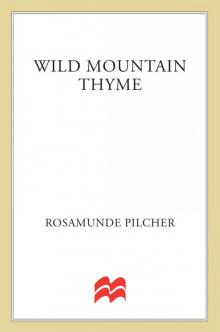 Wild Mountain Thyme
Wild Mountain Thyme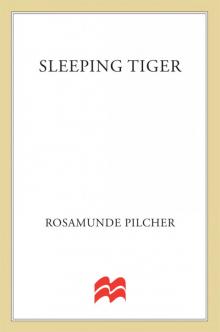 Sleeping Tiger
Sleeping Tiger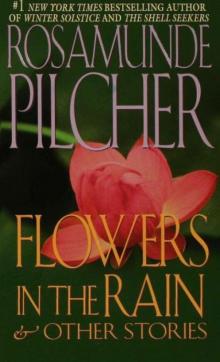 Flowers in the Rain & Other Stories
Flowers in the Rain & Other Stories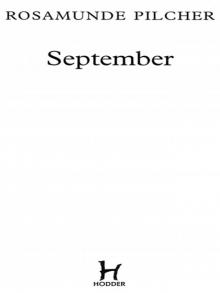 September
September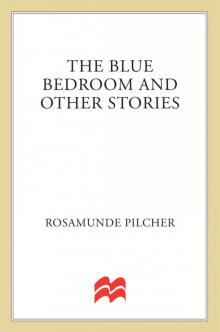 The Blue Bedroom: & Other Stories
The Blue Bedroom: & Other Stories The Carousel
The Carousel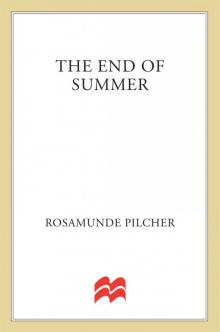 The End of Summer
The End of Summer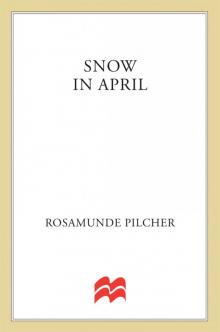 Snow in April
Snow in April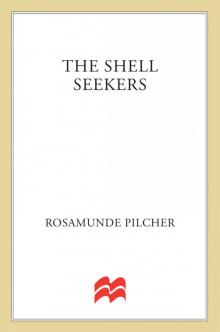 The Shell Seekers
The Shell Seekers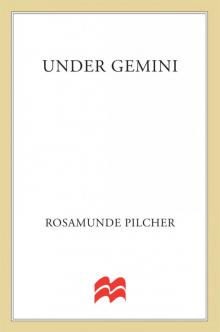 Under Gemini
Under Gemini The Empty House
The Empty House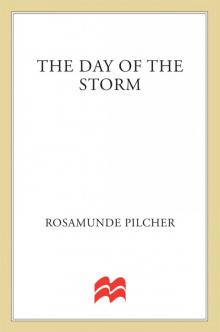 The Day of the Storm
The Day of the Storm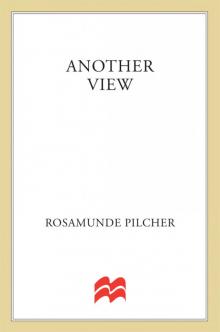 Another View
Another View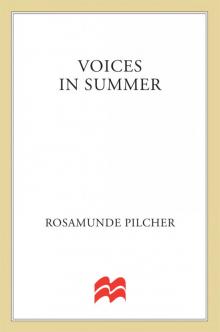 Voices in the Summer
Voices in the Summer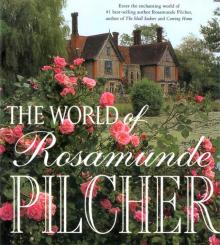 The World of Rosamunde Pilcher
The World of Rosamunde Pilcher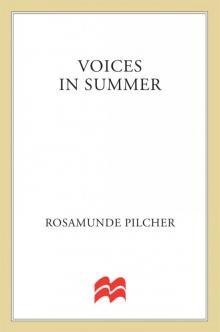 Voices In Summer
Voices In Summer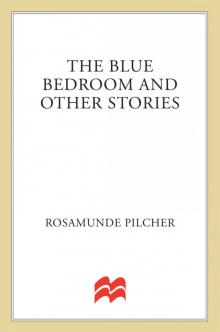 Blue Bedroom and Other Stories
Blue Bedroom and Other Stories